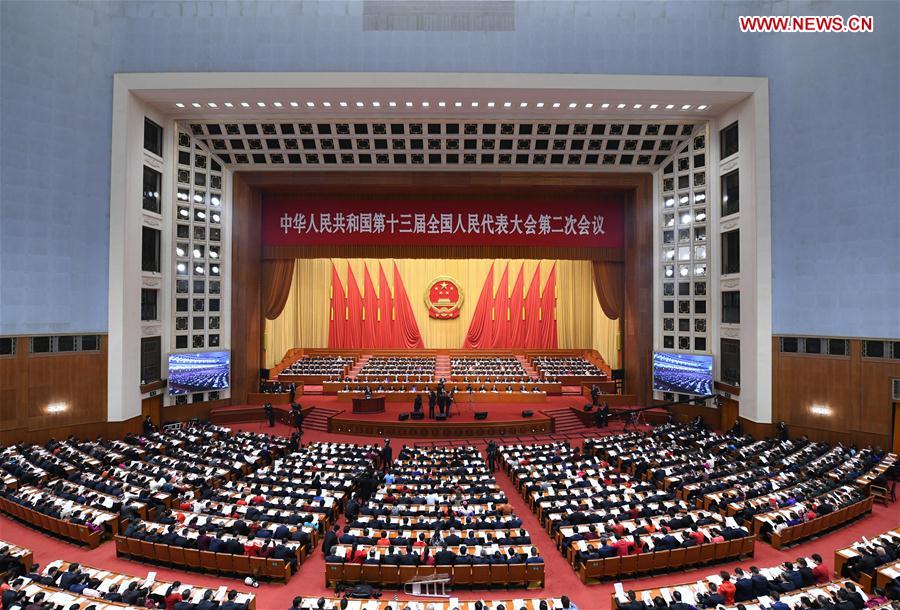2019.03.30
10

The second session of the 13th National People's Congress opens at the Great Hall of the People in Beijing, capital of China, March 5, 2019. [Photo/Xinhua]
China held its annual legislative and political consultations sessions in March. During the sessions, Premier Li Keqiang delivered the government work report, laying out economic and social development targets for the year 2019. Some delegates to the National Peoples Congress(NPC) and members of Chinese People's Political Consultative Conference(CPPCC) have also made a series proposals for developing China's transport sector during the sessions. TransFORM has provided a summary on what has been said.
Government work report
In the government work report, Premier Li has pledged further tax rebates to boost real economy. Starting from May, the tax rate will be lowered from 10% to 9% for transportation and construction sector, among other industries.
The central government also plans to complete 800 billion yuan (USD120 billion) rail investment, and 1.8-trillion-yuan (USD 267 billion) investment in road and water transport in 2019. The government will also speed up planning and building of railways linking Sichuan and Tibet, and boost infrastructure construction for inter-city transport, logistics, civilian and general aviation.
Li also urged the country to strengthen ecological conservation as well as build comprehensive transport systems along the Yangtze Economic Belt.
Improve quality of urbanization and regional integration
With regard to central government's plans to improve quality of urbanization and regional integration, delegates and members have proposed to further improve transport infrastructure and services integration in Beijing-Tianjin-Hebei area, the Greater Bay Area, Chengdu-Chongqing Economic Zone as well as the Yangtze River Delta.
Guo Jifu, Director of the Beijing Transportation Research Center, also a CPPCC member, proposed to build rail network in Beijing's suburbs to better link the area with downtown Beijing and neighboring provinces.
Pan Ming, a CPPCC memeber, proposed to optimize high-speed rail network planning and construction in the Greater Bay Area. Liu Wei, a CPPCC member, said the new area should integrate its transport management to improve inter-cities transport efficiency for coal residents.
Tackling pollution from vehicles
Li Ganjie, Minister of Environment and Ecology, said the ministry will launch a clean-up campaign to tackle the heavy-duty diesel trucks as part of the country's efforts to control air pollution.
Li Wei, President of Development Research Centre of the State Council, a CPPCC member, said China should optimize its freight transport structure, switching from road to rail and water transport, particularly in the Beijing-Tianjin-Hebei are, in a bid to make the sector more carbon efficient.
Xu Heyi, Chairman of Beijing Automotive Group, a CPPCC member, proposed that the government should issue policies to favor new energy vehicles over diesel trucks in freight transport.
Promoting new energy vehicles
Li Shufu, Chairman of Geely Group, a delegate to the NPC, proposed the government to popularize methanal fuels vehicles. He urged the government to clarify the legitimate status of methanol as new, clean and renewable energy and include methanol in clean energy catalogue, and loosen restriction on the methanol vehicle zone.
Yin Tongyue, Chairman of Chery Automobile Co Ltd, a delegate to the NPC, proposed to make a hydrogen energy national development strategy, in a bid to promote healthy development of the hydrogen energy industry.
Encouraging smart transportation
Li Yanhong, CEO of Baidu, a CPPCC member, proposed to establish AI-aided smart transportation solutions to ease traffic jams, reduce accidents to improve travel times. He said China should speed up setting vehicle and road coordination standards, transform infrastructure, and encourage local governments' particiaption in developming smart transportation.He also proposed demonstration programs of deploying intelligent traffic signals, intelligent parking and other applications, and gradually expand the demonstration.
Yin Tongyue, Chairman of Chery Automobile Co Ltd, a delegate to the NPC, also proposed the country comes up with new laws, regulations or policies to support research development, promotion and application of smart vehicle autonomous operating systems.
Improving regulation on Ride-sharing
Li Xiaopeng, Minister of Transport, said online car-hailing platforms has created new jobs and facilitated economic growth. More than 110 ride-hailing companies have acquired licenses and 247 cities have established their own regulations for the business. His ministry will further strengthen regulation to improve safety, and enterprises should take their responsibilities.
Lu Yongquan, Director of Jiangsu provincial transport authority, also a delegate to NPC, said it is important to speed up data-sharing between government and ride-hailing companies for better supervision.
Subscribe our newsletter to keep up to date with the latest news and analysis... Explore other transport news...